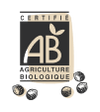Organic farming
Organic farming is an agriculture that guarantees an environmentally friendly production method.
In terms of plant production, it applies a set of sustainable production methods that manage resources, nutritional cycles and soil fertility, not using synthetic chemical products but natural amendments and organic fertilizers: potting soil, compost, simple crushed minerals, rock and bone powders, manure, plant decoctions and macerations, biological control (ladybugs, lacewings, trichogramma, Bacillus thuringiensis, etc.).
Organic farming uses natural predators of crop pests and biological insecticides based on plant essences. It reinvents crop rotations and crop rotations, green manures, and the association of mutually beneficial plants, developing innovative practices in these areas.
This set of practices is subject to specifications and official regulations with European controls and certification.
In order to avoid any risk of genetic pollution or imbalance caused by the presence of GMOs, organic farming has also included in its specifications the prohibition of their use.
What are the specificities of organic seeds?
Seeds from organic farming, and in particular the hardy varieties produced at the Ferme de Sainte-Marthe, have many advantages:
- in terms of high germination capacity (provided they are stored correctly),
- in terms of resistance to parasites and diseases (provided they are grown properly in unpolluted and non-deficient soils),
- in terms of taste and nutritional quality (subject to being harvested at maturity).
More than 400 varieties of organic seeds are available in the Ferme de Sainte Marthe catalog!
Why are some products marketed as “Untreated” by Ferme de Sainte Marthe?
You'll find the "untreated" logo on some of our products. These are high-quality seeds or plants produced using conventional cultivation methods but guaranteed not to have been treated after harvest. We offer them under this label as long as they are not available in organic quality.





